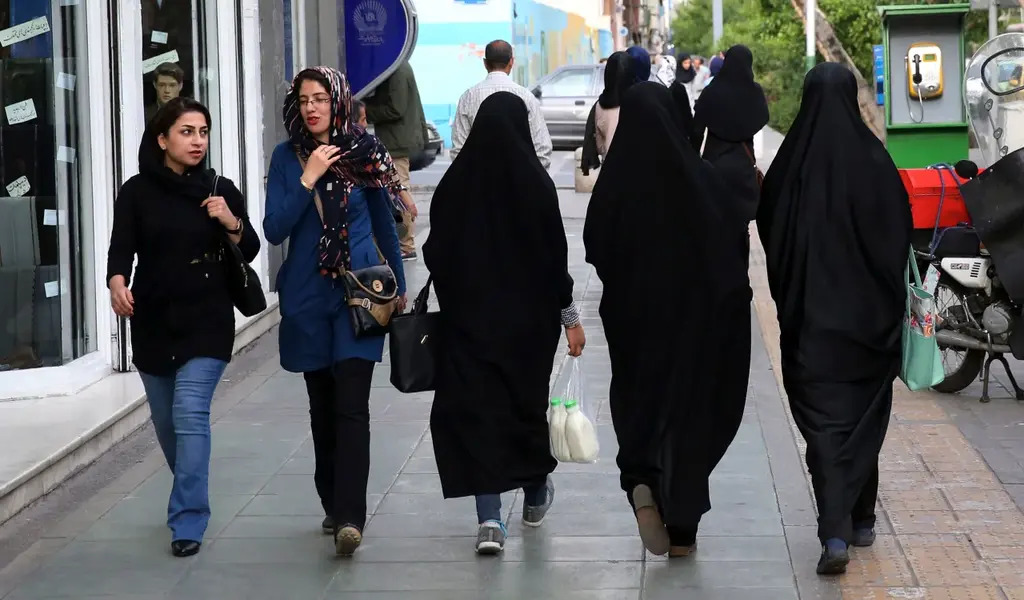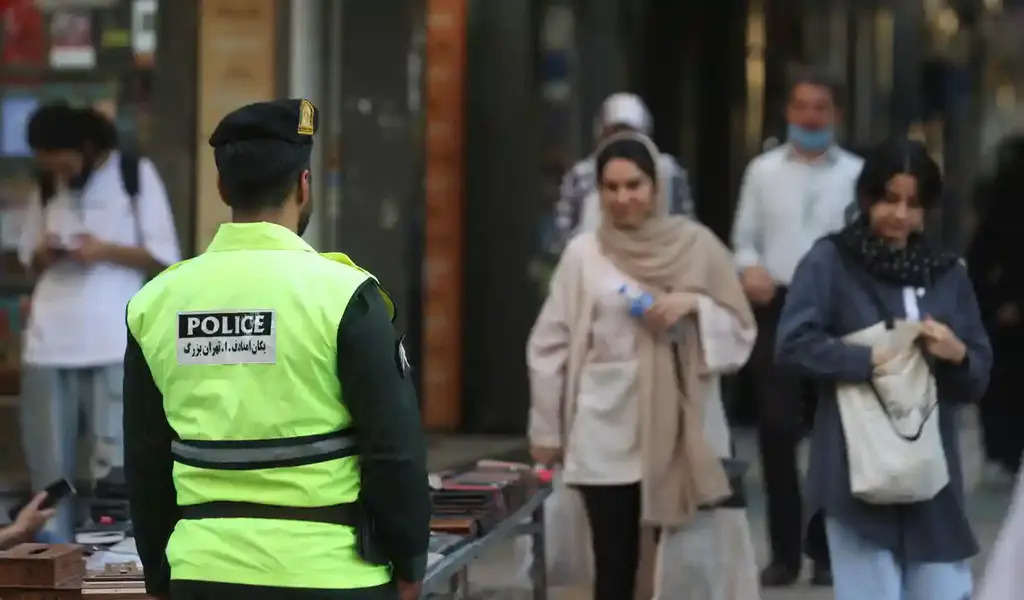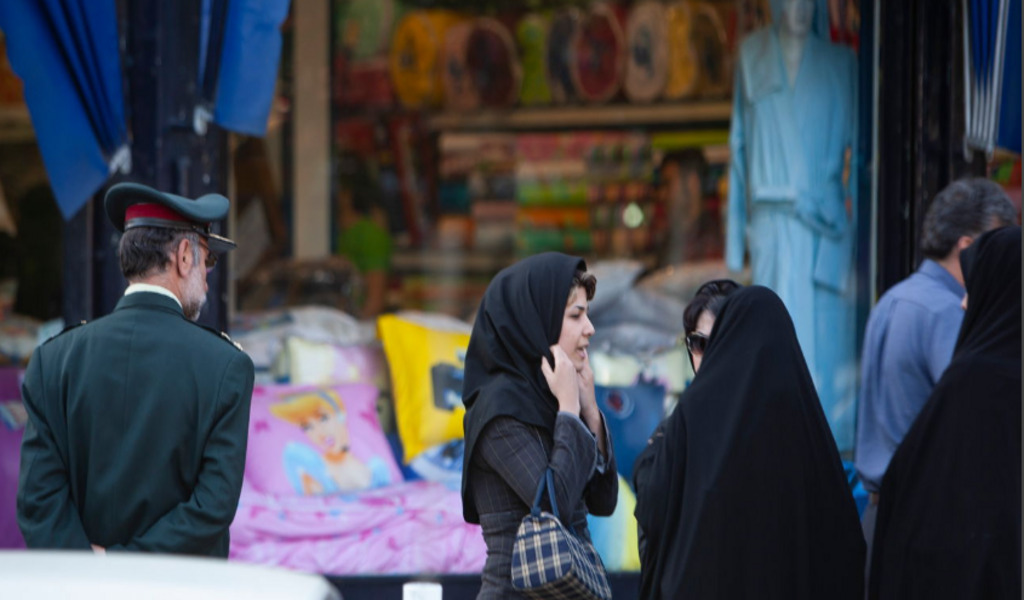News Asia
Iran’s Campaign To Enforce Compulsory Hijab: Resurgence Of Protests And Morality Police
(CTN NEWS) – Iranian authorities have recently launched a new initiative aimed at enforcing the compulsory wearing of the Islamic headscarf for women.
This campaign comes ten months after the tragic death of Mahsa Amini, a 22-year-old woman, while she was in custody.
Resurgence of Protests and Morality Police in Iran following Amini’s Death
Amini’s death had triggered widespread protests across the country, with demonstrators demanding significant changes and even the overthrow of the longstanding theocratic regime that has governed Iran for more than forty years.
Following the incident, the authorities had scaled back the presence of the morality police in an attempt to quell the growing unrest.
However, with the recent announcement, these forces are now being redeployed to the streets, marking a resurgence of their presence.

Resurgence of Morality Police and Controversy over Dress Code Enforcement in Iran
The morality police, known for their strict enforcement of the Islamic dress code, will resume their duties, ensuring that women comply with the requirement to wear the headscarf.
This move has been met with concern and opposition from various segments of Iranian society, including activists and citizens who view it as a regressive step and a violation of individual freedoms.
The death of Mahsa Amini had exposed deep-seated frustrations and disillusionment among Iranians, particularly the younger generation, who are seeking more personal freedoms, social reforms, and a shift towards a more inclusive and progressive society.
The resumption of the morality police’s activities has reignited these grievances and is likely to further fuel discontent among those who desire change.
It remains to be seen how the Iranian population will respond to this new campaign.
While some individuals may adhere to the mandatory dress code to avoid confrontations with the authorities, others may choose to push back against these restrictions, potentially leading to renewed protests and clashes between demonstrators and security forces.
The situation in Iran continues to evolve, and it is uncertain how the government will address the underlying concerns of its citizens.
The imposition of stricter dress code enforcement highlights the ongoing struggle between conservative elements within the regime and those advocating for greater personal freedoms and social progress.
Decline of Protests and Relaxation of Morality Police Presence in Iran
Earlier this year, the protests in Iran gradually subsided following a severe crackdown by the authorities, resulting in the deaths of over 500 protesters and the detention of nearly 20,000 individuals.
Despite these measures, many women, particularly in Tehran and other cities, continued to defy the official dress code by not wearing the Islamic headscarf.

Resumption of Morality Police Activities and Arrest of Actor in Iran
In the aftermath of the protests, sightings of the “morality police” on the streets became increasingly rare, leading to speculation, later refuted, that they had been disbanded.
However, the Iranian authorities maintained that the rules regarding the mandatory hijab had not changed.
The ruling clerics in Iran consider the hijab as a fundamental element of the Islamic revolution that brought them to power.
They perceive more relaxed dress styles as a symbol of Western decadence, contrasting with their conservative values.
On Sunday, General Saeed Montazerolmahdi, a police spokesperson, announced that the “morality police” would resume their activities by notifying and detaining women who were not wearing the hijab in public.
In Tehran, both male and female members of the “morality police” could be observed patrolling the streets using marked vans.
In a separate incident, Mohammed Sadeghi, a relatively unknown young actor, was arrested by the police during a raid on his residence. It appears that Sadeghi had livestreamed the raid on social media.
Prior to his arrest, he had posted a video in response to another online video showing a woman being detained by the “morality police.”
In his video, he expressed strong emotions, stating that witnessing such scenes might drive him to commit acts of violence.
According to the website of the semi-official Hamshahri daily, which is associated with the Tehran municipality, Sadeghi was arrested on charges of inciting people to use weapons against the police.

The issue of the hijab became a significant rallying point during the previous year, with women taking a leading role in the protests.
What began as demonstrations quickly transformed into demands for the overthrow of Iran’s clerical rulers, who were accused by the predominantly young protesters of corruption, repression, and being disconnected from the realities of society.
The Iranian government, without providing evidence, attributed the protests to a foreign conspiracy.
Numerous Iranian celebrities, including renowned directors and actors from the country’s esteemed film industry, actively participated in the protests.
Some Iranian actors were detained for either appearing in public without wearing the hijab or expressing support for the demonstrations.
In a recent incident, actor Azadeh Samadi was not only prohibited from using social media but was also mandated by a court to undergo psychological treatment for an alleged “antisocial personality disorder.”
This ruling came after she attended a funeral two months ago while wearing a cap on her head.
RLATED CTN NEWS:
Deadly Flooding Ravages South Korea, Claims 22 Lives As Torrential Rain Persists
India’s Path To Becoming The World’s Second-Largest Economy By 2075: Goldman Sachs Projections
China’s Ambitious Plan: Landing Humans On The Moon By 2023 With Dual Rocket Approach

News Asia
Bangladesh Supreme Court to Rule on Controversial Job Quotas Amid Nationwide protests

(CTN News) – The future of public service hiring regulations, which have provoked national conflicts between police and university students that have resulted in at least 133 fatalities so far, is set to be decided by Bangladesh’s Supreme Court on Sunday, or today.
Later in the day, the nation’s highest court will meet to declare its decision about the controversial job quotas—either in favor of or against their elimination.
This week’s protests over politically motivated admission quotas for highly sought-after government posts turned into some of the worst instability during Prime Minister Sheikh Hasina’s watch.
Due to the ongoing turmoil, a curfew has been in place since Friday. In addition, the government has declared a two-day holiday during which all offices and institutions would be closed.
After riot police were unable to restore order, soldiers are now policing cities throughout Bangladesh, and since Thursday, there has been a statewide internet blackout that has severely limited the flow of information to the outside world.
SEE ALSO: Nearly 1,000 Indian Students Return from Bangladesh Amid Deadly Unrest Over Job Quota System

Hasina made hints to the public this week that the plan will be abandoned, which comes after her opponents accuse her government of using the judiciary to further its own agenda.
However, a positive decision is unlikely to calm the nation’s simmering rage in the wake of the intensifying crackdown and growing dead toll.
Business owner Hasibul Sheikh, 24, told AFP, “It’s not about the rights of the students anymore,” while observing a Saturday street demonstration in the capital city of Dhaka against a statewide curfew.
“Our demand is one point now, and that’s the resignation of the government,” he stated.
A system that reserves more than half of civil service positions for particular groups, like as children of veterans of the 1971 war, is the driving force behind the upheaval this month.
Hasina, 76, has ruled the nation since 2009 and won her fourth consecutive election in January following a ballot in which there was no real competition, according to critics who claim the program helps families who support her.

Rights organizations accuse Hasina’s government of abusing state institutions, including as the extrajudicial assassination of opposition activists, in order to strengthen its grasp on power and quell dissent.
Bangladesh’s 170 million people lack access to sufficient employment possibilities, therefore the quota system is a major cause of anger for recent graduates who are struggling to find work.
“The government’s actions have made the situation worse, rather than trying to address the protesters’ grievances,” Pierre Prakash, Asia director of Crisis Group, told AFP.
After a week of increasing violence, Hasina canceled her intentions to depart the nation on Sunday for a diplomatic trip to Spain and Brazil.
Source: The Indian Express
News Asia
Pakistani Government Plans to Ban PTI

(CTN News) – The Pakistani government has announced measures to outlaw Pakistan Terheek-e-Insaf (PTI), the party of imprisoned former Prime Minister Imran Khan.
Information Minister Attaullah Tarar made the declaration on Monday, only days after the Supreme Court declared the PTI eligible for a share of reserved seats in national and provincial assemblies.
After reviewing all relevant information, the government has decided to ban PTI. “We will file a case to ban the party,” he said, citing claims such as inciting violent protests last year and leaking confidential information.
Tarar stated that the case would be moved to the Supreme Court.
He also stated that the government intended to file treason charges against Khan and two other senior party leaders, former President of Pakistan Arif Alvi and ex-Deputy Speaker of the National Assembly Qasim Suri, as well as a review appeal against the Supreme Court’s ruling that the PTI should be allocated some assembly seats reserved for women and members of religious minorities.

According to Sayed Zulfiqar Bukhari, a top PTI politician and party spokesperson, the government’s action “betrays their complete panic”.
“After realizing that they could no longer threaten, compel, or blackmail judges, they decided to make this move through the cabinet. “All of their attempts to stop us have been declared illegal by the courts,” he stated.
Last week, the Supreme Court recognized the PTI as a political party and confirmed that the party’s lack of an electoral emblem did not affect its legal right to field candidates.
The verdict was in response to the PTI being barred from competing in parliamentary elections in February using its party emblem, the cricket bat, forcing it to field candidates as independents.
Despite the setback, PTI-backed candidates emerged as the largest parliamentary bloc, winning 93 seats.
After Khan declined to cooperate with his political opponents, the Pakistan Muslim League-Nawaz (PMLN) and Pakistan People’s Party (PPP) formed a coalition government with other smaller parties.
Ex-Governor Sindh Zubair, who formerly served in the PMLN, stated that the government’s action was in response to the Supreme Court’s ruling last week and warned of political upheaval ahead.
“The powers that be are trying to disenfranchise the largest majority of voters of the country, who voted for PTI,” he disclosed to Al Jazeera.

Khan was appointed prime minister in August 2018 but was dismissed from power in April 2022 after a parliamentary vote of no-confidence.
The cricketer-turned-politician has since faced a slew of legal issues, including charges of misplacing and leaking the contents of a confidential cable delivered to Islamabad by Pakistan’s then-ambassador in the US in 2022.
Khan has continually disputed the charge, claiming that the dossier contained evidence that his resignation as prime minister was orchestrated by his political opponents and the country’s powerful military, with assistance from the US administration. Both Washington and Pakistan’s army deny the accusation.
Despite multiple recent court verdicts in his favor, Khan has been in prison since August of last year.
Source: Aljazeera
News Asia
NAB Re-Arrests Imran Khan and Bushra Bibi After Iddat Case Conviction Overturned

(CTN News) – Former Prime Minister Imran Khan and his wife, Bushra Bibi, were acquitted in the Iddat case by a sessions court on Saturday, less than 24 hours after the Supreme Court ruled in favor of the PTI in reserved seats.
However, their relief was short-lived when Imran Khan was detained by the National Accountability Bureau (NAB) for selling official goods. Bushra Bibi was also rearrested in this case while being released from Adiala Jail’s Gate No. 3.
According to sources, the NAB detained Bushra Bibi after the bureau’s chairman issued arrest warrants for her and Imran Khan. Both are to be investigated in Adiala Jail.
Opposition leader Omar Ayub Khan condemned Bushra Bibi’s imprisonment and criticized the Adiala Jail administration. He also cautioned the jail superintendent of the repercussions and announced that a privilege motion would be filed against him.
Imran Khan and Bushra Bibi were acquitted in the Iddat case after Additional District and Sessions Judge (ADSJ) Mohammad Afzal Majoka reversed their previous verdict, which sentenced them to seven years in prison on February 3, five days before the general election.
Imran Khan’s lawyers, Usman Gill and Zaheer Abbas, were in court when the verdict was pronounced.
In the 28-page ruling, Judge Majoka rejected Khawar Fareed Maneka, Bushra Bibi’s ex-husband,’s arguments that Imran Khan and Bushra Bibi’s nikah was illegally performed and that Mr. Maneka was denied Buju (reconciliation rights) under religious law.
The court also rejected the allegation of fornication under provision 496-B of the Pakistan Penal Code (PPC), stating that no charge was filed under this provision against both Imran Khan and his spouse “because there was no evidence of a second witness”. The trial court heard only one witness, Mr Maneka’s domestic servant.
“In these circumstances, it cannot be said that the appellants committed fornication,” the judge wrote. Regarding the charge of contracting marriage fraudulently during the Iddat period, the judge found that in a video given as evidence during the trial, Mr. Maneka lauded his ex-wife, Bushra Bibi, and “deposed that his ex-wife is a pious lady.”
The magistrate inquired about “how this witness [Mr Maneka] can claim that the appellant No. 2 [Bushra Bibi] committed fraud with him” .
The court announced its decision: “From a perusal of Section 496 PPC and the above-mentioned esteemed citations, this court is of the view that the appellants have not gone through any marriage ceremony fraudulently or with dishonest intention because none of the parties claimed that nikah was not performed and fraudulently he or she was supposed to believe that marriage ceremony was solemnised.”
The court judgment added: “In the instant instance, it is the complainant’s case that the appellants’ nikah was done on January 1, 2018, followed by the second nikah in February 2018. By no stretch of the imagination, it was a marriage with dishonest or deceptive intentions.”
Regarding Mr. Maneka’s claim that he was denied reconciliation rights and so deceived by Imran Khan and Ms. Bibi, the court noted that during cross-examination, Mr. Maneka stated that he learned of the appellants’ marriage on the second day of their nikah.
Before submitting the complaint, the judge questioned why Mr Maneka had been silent on his reconciliation rights for six years.
The judge stated, “The complainant has failed to prove his case against the appellants.” As a result, both appeals filed by appellants No. 1 [Imran Khan] and No. 2 [Bushra Bibi] are accepted, the judgment of the learned trial court of February 3, 2024, is overturned, and both appellants are acquitted of the accusation.”
The court ordered their freedom unless they needed to be imprisoned in other cases.
Source: DAWN
-

 News4 years ago
News4 years agoLet’s Know About Ultra High Net Worth Individual
-
Entertainment3 years ago
Mabelle Prior: The Voice of Hope, Resilience, and Diversity Inspiring Generations
-
News11 years ago
Enviromental Groups Tell Mekong Leaders Lao Dam Evaluation Process Flawed
-

 Health4 years ago
Health4 years agoHow Much Ivermectin Should You Take?
-

 Tech3 years ago
Tech3 years agoTop Forex Brokers of 2023: Reviews and Analysis for Successful Trading
-

 Lifestyles3 years ago
Lifestyles3 years agoAries Soulmate Signs
-

 Entertainment3 years ago
Entertainment3 years agoWhat Should I Do If Disney Plus Keeps Logging Me Out of TV?
-

 Health3 years ago
Health3 years agoCan I Buy Ivermectin Without A Prescription in the USA?